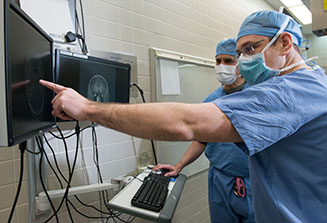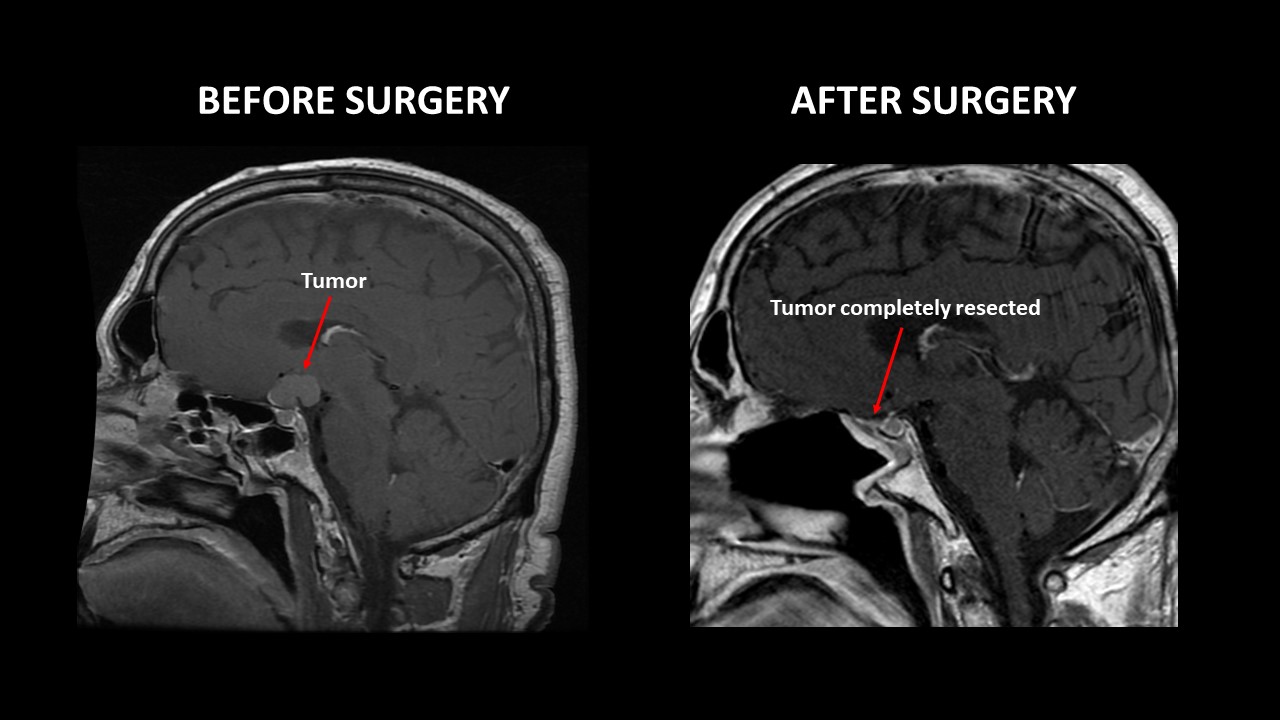Time Matters When Treating Tumors
Request a specialist today, see one tomorrow.
Advanced care when you need it fast
The Henry Ford Skull Base, Pituitary and Endoscopy Center offers guaranteed appointments with a neurosurgeon or otolaryngologist within 24 business hours. We provide immediate access for you at any point during your care process – from second opinions to comprehensive care management, surgery or primary postoperative care.
We diagnose and treat all skull base and intracranial conditions, including:
- Pituitary adenoma
- Meningioma: Common tumor from the meningeal lining of the brain
- Acoustic neuroma
- Neurofibroma
- Craniopharyngioma: Rare tumor near the pituitary gland
- Encephalocele: Herniated brain tissue through the skull base, which may cause a cerebrospinal fluid leak
- Rathke cleft cyst: Cyst located near the pituitary gland
- Fibrous dysplasia
- Metastatic brain tumors
Nasal and sinus tumors

If breathing through your nose has become difficult, our experts can work with you to correct it. Any number of problems can be responsible for nasal or sinus problems. Sometimes symptoms of nasal congestion, nosebleeds, or facial pain and pressure may be a result of tumors of the nasal cavity or sinuses.
At Henry Ford, our Otolaryngologists are specially trained in the diagnosis and treatment of nasal and sinus tumors. Early symptoms of sinonasal cavity (the space between the eye and upper jaw) and skull base tumors are similar to symptoms of sinusitis, including discharge, nasal obstruction, difficulty breathing through the nasal cavity, pressure sensation in the midface, and nosebleeds. Other symptoms may include loosening and numbness of the upper teeth, eye bulging, double or blurred vision, tearing, and, for very advanced lesions, loss of vision, inability to open the mouth, hearing loss, headaches, ear pain, and even mental status changes.
Advances in endoscopic and minimally invasive techniques have significantly increased the options available to patients with these diseases.
Advanced skull base surgery
When surgery is recommended, surgeons from various departments may participate in the procedure to ensure your best possible outcome. The Henry Ford skull base program:
- Utilizes the most advanced minimally invasive endoscopic approaches and image-guided surgical navigation systems, including intraoperative MRI and intraoperative neuronavigation systems
- Offers personalized, evidence-based treatment plans
- Ensures review of each new case by our multidisciplinary Skull Base Tumor Board
- Provides a range of treatment options including surgery, tumor embolization or stereotactic radiation therapy
- Includes special expertise in skull base reconstruction – improves functional and cosmetic outcomes, and reduces the risk of cerebrospinal fluid leaks and infection

Immediate testing and advanced treatment
The Henry Ford skull base team offers guaranteed appointments within 24 business hours with a neurosurgeon or otolaryngologist. In addition, each new patient case is reviewed at our Skull Base Tumor Board by a multidisciplinary team of experts. Based on this collaborative review, we work with you to develop a comprehensive, personalized treatment plan.
Depending on your individual case, this treatment may include one or more of the following advanced tests:
- 3-D MR spectroscopy and 3-D neuroimaging for intraoperative guidance
- High-field 3-T MRI
- Speech-language evaluations including Wada studies
- Carotid angiography and balloon occlusion testing
- CT, MR and nuclear cisternography
The Skull Base, Pituitary and Endoscopy Center also is a national leader in the use of technologies that make surgery safer.
What are skull base lesions?
A skull base lesion is a general term that can refer to any pathological condition that affects the base of the skull. These conditions include:
-
Skull base tumors
A skull base tumor is a growth of abnormal cells in the tissues involving the membranes and bone surrounding the brain. A skull base tumor can be benign (noncancerous) or malignant (cancerous). Either way, it can place pressure on tissues and impair function.
-
Skull base cysts
Cysts are noncancerous, fluid-filled lumps. Depending on their size and location in the skull, these may or may not produce symptoms.
-
Encephalocele
This is a birth defect in the neural tube that forms the brain and spinal cord. An encephalocele is characterized by a sac-like projection of the brain and its enclosing layers through the back of the skull.
-
Cerebrospinal fluid (CSF) leak
A CSF leak occurs when the membranes around the brain tear and a hole in the bony skull base allows cerebrospinal fluid to leak out of the nose, down the back of the throat or possibly out of the ears.
Symptoms from skull base lesions depend on the type, size and location of the tumor. Symptoms may be caused by tumor compression of nearby nerves or blood vessels, or by extension of the tumor into nearby areas of the brain, brainstem, nose, ear or face. Symptoms may include headaches, vision or hearing problems, facial weakness, motor and balance problems, nausea and vomiting or seizures.
.svg?iar=0&hash=F6049510E33E4E6D8196C26CCC0A64A4)

/hfh-logo-main--white.svg?iar=0&hash=ED491CBFADFB7670FAE94559C98D7798)